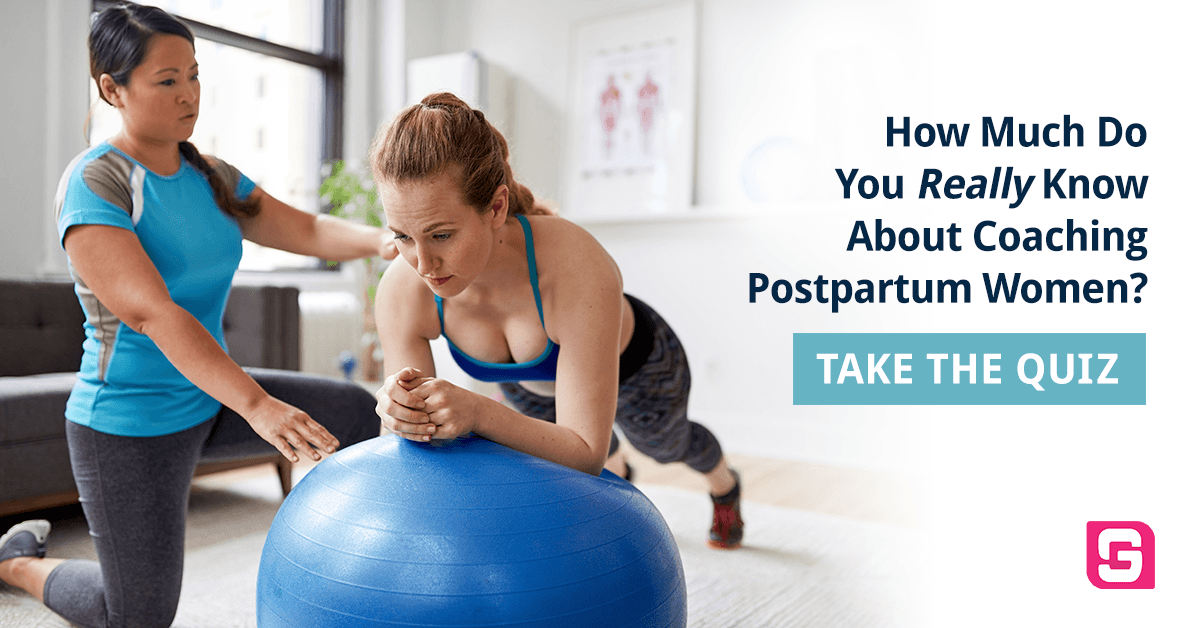
Let’s be honest: Coaching women in the postpartum period requires a unique set of knowledge and skills.
Women who are postpartum have not only just “grown” a human, but birthed that human and been thrown into the demanding role of motherhood.
They may struggle with…
- Pelvic organ prolapse
- Diastasis recti
- Postpartum depression
- Incontinence
- C-section recovery
- Fatigue
- Lack of sleep
… in addition to the fact that they just went through a huge life event and are now coping with the physiological, emotional, mental, lifestyle, and social changes that come with the transition into motherhood!
Given that the majority of women will be pregnant or postpartum at some point in their lives, it’s a pretty safe bet that if you work with adult women, it’s not a matter of if you will work with postpartum clients — it’s a matter of when.
So with that said, how prepared are you to handle curveballs like these when you’re working with your postpartum clients?
Are you confident about your knowledge of postpartum anatomy and physiology?
Are you ready to navigate challenging and sensitive conversations with your clients, such as in the case of postpartum depression or infant loss?
Are you willing to test your knowledge to identify where you’re already prepared — and where you still have more to learn?
When It Comes to Coaching Postpartum Women: Are You Ready?
There are eight key topics in which health, fitness, and nutrition professionals should be well versed when it comes to coaching postpartum women. Developing your skills in these areas and preparing to work specifically with a postpartum client base will not only give you more confidence but make a huge positive difference in the lives of your clients.
Our quiz gives you a chance to assess your skills in each of these eight topics so that you can take an objective look and see where you’re already super prepared — and where there’s room for improvement.
Quick tip: When you’re answering, be honest with yourself. There will be areas where you’re less familiar, and you know what? That’s exciting! It’s an opportunity to learn more.
Plus, at the end of the quiz, you’ll find an excellent selection of resources so that you can learn more about the topics covered here.
And if you’re still hungry for more, if you want to know exactly how to answer client questions, obtain an even better understanding of what they’re going through, and have hundreds of pages of evidence-based information at your fingertips, we recommend checking out our GGS Pre- & Postnatal Coaching Certification.
Our team of experts (including PhDs, pelvic health physios, OB/GYNs, and pre- and postnatal fitness experts) created this cutting-edge, comprehensive curriculum to teach health and fitness professionals exactly how to confidently coach pre- and postnatal women and keep them safe, healthy, and strong — both during and after pregnancy. So if you have more learning to do, we’re here to help.
Quiz Time!
Before we begin, it’s important to note that the questions in this quiz are focused solely on specific situations postpartum women may encounter or experience, meaning we are not testing you on the basic coaching skills that anyone working with clients should have. For example, you will not see questions about:
- Basic coaching communication and listening skills.
- How to write training programs for different goals.
- General anatomy and physiology.
- The biomechanical differences between male and female clients.
- The similarities and differences in coaching psychology when working with male versus female clients.
- Building rapport and trust with your clients.
- Aerobic capacity, blood pressure, or fat distribution.
- Modifying, progressing, or regressing any exercise at a moment’s notice during sessions.
- Helping clients set behavior-based goals.
- And many, many more essential coaching skills.
Rather, you will see questions on topics like postpartum anatomy and physiology, postpartum nutrition, and your professionalism when it comes to working with this clientele. Please note, though, that anatomy and experience varies among women, and that not every question will be relevant to every woman.
For each of the questions, give an honest assessment of your knowledge on a scale of 0–5, where 0 means you know nothing about the topic, and 5 means you’re an expert.
Articles – Girls Gone Strong